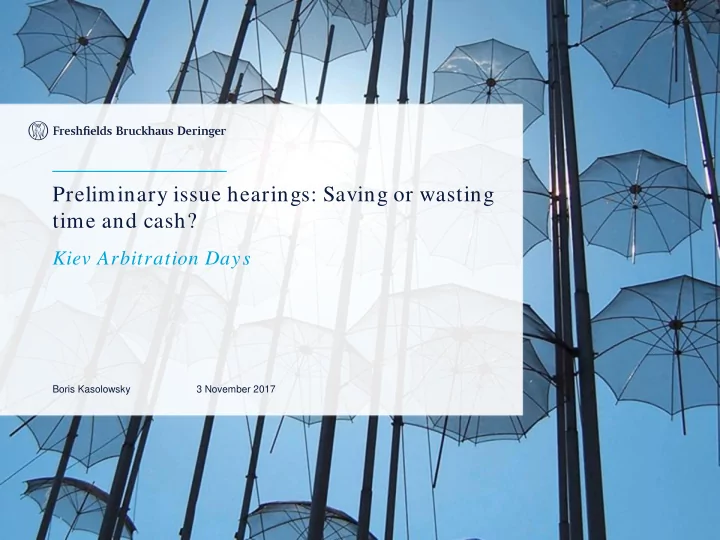

Preliminary issue hearings: Saving or wasting time and cash? Kiev Arbitration Days Boris Kasolowsky 3 November 2017
Vetting Procedure under ICC Rules • Governed by the ICC Arbitration Rules . • Articles 6(3) and 6(4) permit the Secretary General of the ICC to refer matters to the Court where: • a party does not submit an Answer; • a party has raised a plea concerning the existence, validity or scope of the arbitration agreement; • Whether all of the claims should be brought in the same arbitration. • If not satisfied that there might be an arbitration agreement based on prima facie evidence, the Court can refuse to allow the case to proceed arbitration. 2
Vetting Procedure under ICSID Rules • ICSID Institutional Rules under Rule 6 allow the ICSID Secretary-General to refuse the registration of requests for arbitration where: • On the basis of the information in the request, the dispute is manifestly outside of the jurisdiction of the Centre. • Article 25 of the ICSID Convention contains the jurisdictional requirements. It must be: • a legal dispute; • arising directly out of the investment; • between a Contracting State and a national of another Contracting State; • consent to the jurisdiction of the Centre in relation to the dispute. 3
Preliminary issues considered by Arbitrators ICC • Article 22 Arbitration Rules : “The arbitral tribunal and the parties shall make every effort to conduct the arbitration in an expeditious and cost-effective manner, having regard to the complexity and value of the dispute.” ICSID • Rule 41 – preliminary objections on jurisdiction and merit. 4
Other Arbitration Institutions and Summary Judgment • Few arbitral institutions have expressly incorporated summary judgments as options. Notable exceptions include: • SIAC - Rule 29: Early Dismissal of Claims and Defences • Allows for summary judgment on the basis of merit and jurisdiction. • Does not permit the Tribunal to dismiss applications on its own initiative. • SCC - Article 39 Summary procedure • Allows for summary judgment on the basis of merit and jurisdiction. • The Tribunal is required to determine the procedural steps taken and their deviation from standard proceedings. • The Tribunal must consider several factors, including efficiency. 5
Case Example of Summary Judgment in Arbitration • ‘Travis Coal Restructured Holdings LLC v Essar Global Fund Limited, [2014] EWHC 2510’ • Concerned an appeal to the English High Court of an enforcement order concerning an arbitration award under ICC Rules. • The Tribunal had ruled on a claim on a summary basis by rejecting several of the party’s arguments. • The arbitration agreement provided a wide discretion: “arbitrators shall have the discretion to hear and determine at any stage of the arbitration any issue asserted by any party to be dispositive of any claim or counterclaim, in whole or part, in accordance with such procedure as the arbitrators may deem appropriate, and the arbitrators may render an award on such issue”. • The Court found that the Tribunal had accorded each party a fair opportunity to be heard and that the Tribunal’s power to give summary judgment fell within the ambit of the arbitration agreement. 6
Conclusion • Preliminary issues hearings are a feature of international arbitration. • Robust tribunals are needed, not affected by “due process paranoia” • National courts are unlikely to oppose the practice 7
Recommend
More recommend